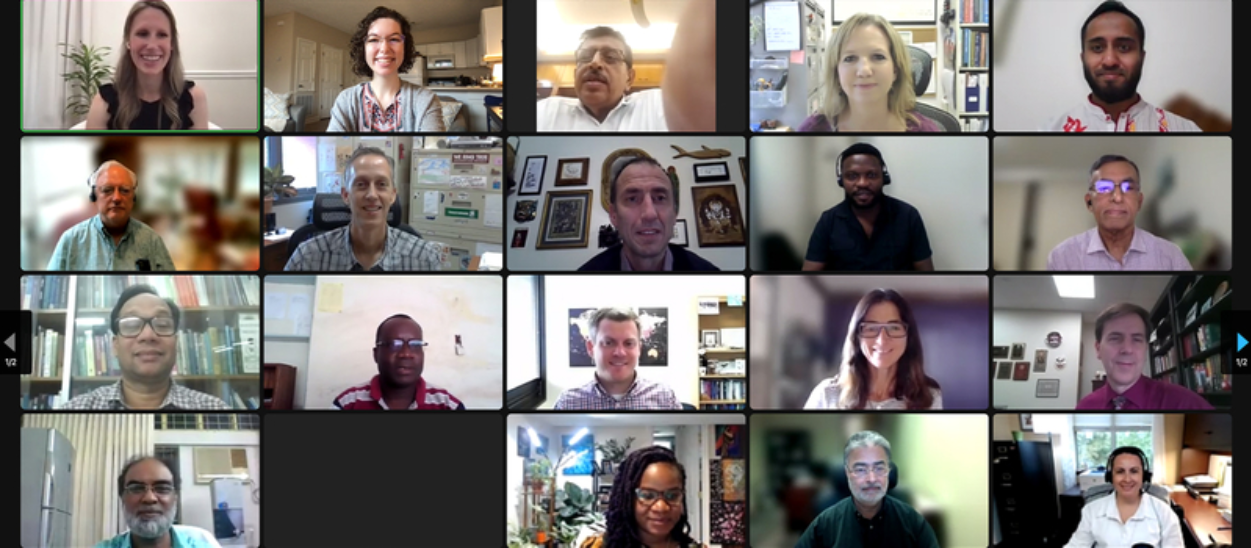Collaborating, Learning and Adapting in Innovation Labs: Insights from the Fish Innovation Lab’s Learning Meetings

This post originally appeared on the Feed the Future Innovation Lab for Fish website and Agrilinks and was written by Rebecca H. Jeudin.
Innovation labs serve as pivotal platforms of USAID funding for testing and refining novel ideas. Their efficacy often hinges on the continuous assimilation of insights from both triumphs and setbacks. As part of the implementation of USAID’s approach for Collaborating, Learning and Adapting (CLA), learning agendas provide a forum for implementers to share successes and challenges, cultivating a culture of collaborative learning and expediting progress.
The Feed the Future Innovation Lab for Fish approach to CLA is founded on the commitment to fostering knowledge sharing and collaboration in the realm of aquaculture and fisheries. The Learning Agenda has served as a dynamic process of sharing experiences, challenges and successes among research teams through a comprehensive set of learning questions, which guided reflective discussion sessions and were designed to test the program’s theory of change, explore assumptions, address knowledge gaps and enhance decision-making. These centered on five pivotal themes: the impact of COVID-19, women and youth engagement, public and private sector stakeholder engagement, innovation/technology adoption and scaling with a resilience lens, and health and nutrition. The learning events provided opportunities for researchers to exchange experiences, challenges and adaptation methods.
Through structured events and discussions, the Learning Agenda facilitated knowledge exchange on a global scale. Fish Innovation Lab teams gained insight into how different nations approach similar problems, leading to a broader perspective on challenges and solutions. This global perspective has sparked innovation and creativity in research, enabling activities to explore novel pathways to enhance the sustainability and productivity of the aquaculture and fisheries sectors. As a result, participants reported an enhanced understanding of diverse research areas and approaches. This, in turn, fueled the cultivation of cross-disciplinary collaborations, leading to a more holistic approach to addressing complex issues. The Learning Agenda, as part of the Fish Innovation Lab CLA approach, emphasized the translation of knowledge into practical solutions, and it encouraged engagement with local communities and stakeholders. This approach not only increased awareness of issues related to gender and social inclusion but also capacity building, nutritional needs and behavior change.
The Learning Agenda’s effectiveness isn’t confined to the Fish Innovation Lab. It offers a blueprint for other innovation labs to foster partnerships and utilize local solutions to empower communities with the knowledge and resources necessary for continued growth, sustainability and resilience. Moreover, by nurturing a community of practice, the benefits of these insights can be disseminated to a broader audience.
For stakeholders like USAID and other innovation lab implementers, the Learning Agenda offers a powerful tool for maximizing the impact of their work. By fostering a culture of collaborative learning, innovation labs can accelerate progress, avoid repeating past mistakes and maximize the impact of their work. From the Fish Innovation Lab’s experience, recommendations include:
- Early Implementation: Integrate the Learning Agenda early, allowing for prompt challenge identification and strategy formulation.
- Regular Adaptation: Periodically review and adapt the Learning Agenda, aligning with activity needs and prior insights, and disseminate these to inform the broader development community.
- Integration: Use Learning Agenda questions to inform practical applications and view mistakes as growing opportunities.
- Cross-Collaboration: Promote collaboration amongst research activities within the innovation lab to allow teams to exchange experiences, including engaging external experts for technical insights.
- Impact Measurement: Gauge the influence of the Learning Agenda meeting on outcomes, refining future designs.
The lessons learned from the Learning Agenda meetings will be invaluable in shaping the future direction of innovation labs and ensuring their continued success in achieving their objectives.




